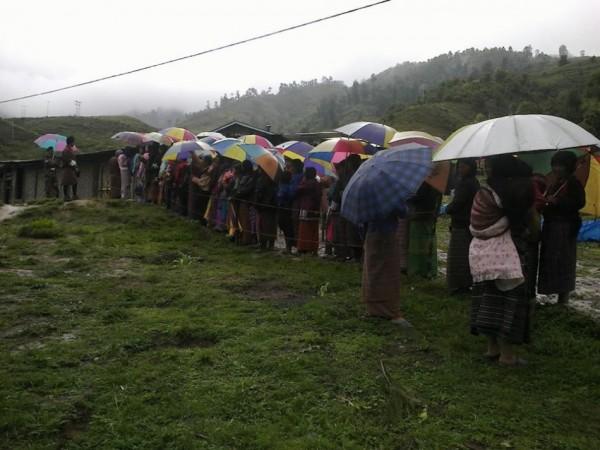
If your father gave you the most desirable gift on earth, you would make the most out of it. Bhutanese received a gift of sorts five years ago when they were enshrined with the power to elect their own leaders through voting.
Democracy is a new word for them, but here is a tiny Himalayan nation which seems to have long moved on from its naivety, voting in every way possible for their second only democratic government ever since their king abdicated his powers for his citizens.
Polling officers in Bhutan have travelled to far off remote villages, walking in muddy and mountainous footpaths for days to make sure every nomad, farmer or dwellers in rustic settlements like northern districts of Lulana and Gasa, gets a chance to vote. The Day of voting, Friday, 31 May was declared a national holiday and people from far-flung places travelled, in some cases for days, to their respective constituencies to exercise their franchise. Those who were not able to travel to their constituencies voted through "postal ballot", wherein they send their votes by posts.
When it comes to setting examples, Bhutan seems to do it best.
"In democracy quantity always wins over quality. Knowing that, well informed people should not neglect the opportunity that comes only once in five years," Dhan Kumar Bhujel, a researcher and a political commenter told International Business Times. He travelled all the way from the capital city, Thimphu to his village in the Southern town of Tsirang to vote - a journey of almost 12 hours in car.
"Democracy in Bhutan has worked to certain extent" he continued, "People are more informed, more conscious and a little more willing to speak out their mind, but people still fear the repercussion from higher authority. DPT (the former government) has fulfilled most of the pledges they had made 5 years ago, but there are still some pressing issues that are yet to be resolved."
There were four political parties contesting in the primary round of the national election on Friday. The ruling party and the opposition of the last government were qualified once again to contest on 13 July for the final round, in which the winning party will form the second Bhutanese government.
Eligible voters queued in long lines on Friday to vote. Rain in some places did not deter citizens of this young democracy to make their voice heard, telling the world that they have received the gift of democracy with zeal.
Soman Dendup, a teacher from Bhutan who is currently pursuing further studies in the University of Canberra, Australia, send his vote through postal ballot all the way to Bhutan. He told IBtimes that he didn't want a wrong party to be elected and that his vote mattered.
"Most people are not really aware of what will happen if they elected a wrong party," Dendup said, adding, "As a teacher in particular and being a Bhutanese citizen, I feel, it was too early to have democracy looking at how the first government rolled out,"
Most analysts were sceptic if this tiny nation that had remained under the rule of monarchs ever since it became a nation under the first king, Ugyen Wangchuck in 1907, would be able to receive democracy with meaningfulness when the fourth King, Jigme Singye Wangchuck gave away his powers in 2006. There were others who think democracy was best for a tiny nation like Bhutan.
"I think many citizens were happy with monarchy while others welcomed demoracy," Arun Bhatarai, a journalist with the only television news channel in Bhutan, BBS said. " I do think democracy has worked in Bhutan in the sense that people are willing to voice their concerns more freely and some of the voices are being heard as well."
Known for its guiding principle of "Gross National Happiness", this tiny nation has been trying in earnest to advocate the need to concentrate on the accumulation of happiness in citizens which is deemed more meaningful and nurturing than pursing for economic prosperity defined by GDP. One among many steps taken by the country in its goal of having holistic governance was giving way for democracy. The king was to remain the head of the state while the government was to be overlooked by the Prime Minister and his subordinates in the party.
"Bhutan has changed a lot in the last five years," Karma Jigme from the Tourism Council of Bhutan said. "The unique thing about Bhutan is that democracy is passed on from the throne. About the general election, there is only hope that we get the right people up there who will ultimately take this country forward."
The results of the primary round of election was declared on Friday, the same day the election was held.









!['Abhishek will win national award': Abhishek Bachchan's poignant act will tug your heartstrings in slice of life emotional saga I Want To Talk [trailer review]](https://data1.ibtimes.co.in/en/full/805617/abhishek-will-win-national-award-abhishek-bachchans-poignant-act-will-tug-your-heartstrings.jpg?w=220&h=138)



